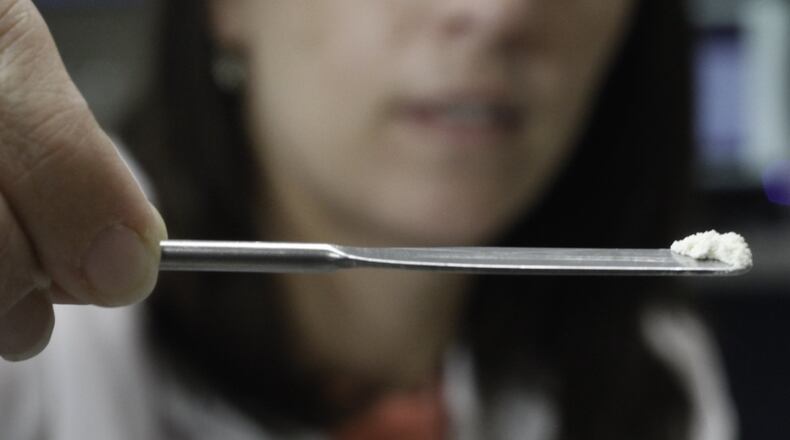Twenty-three people died from overdose deaths in Montgomery County last month, bringing the yearly total to 335 suspected accidental overdose deaths, according to preliminary data from the Montgomery County Community Overdose Action Team.
In 2020, 323 overdose deaths were recorded in Montgomery County. The data also shows that while there was an increase between 2020 and 2021, the numbers are not nearly as high as they were in 2017 when more than 560 people died in Montgomery County from accidental drug overdose deaths.
Health professionals said they believe the reason the numbers have fallen so drastically since 2017 is the availability of Narcan in the community as well as programs such as the community overdose action team and rapid response teams that seek to connect people battling addiction with services.
It’s tough to nail down exactly what is causing the increase in overdose deaths now, said Tina Rezash Rogal, director of strategic initiatives with the Montgomery County Alchohol, Drug and Mental Health Service Board. But the coronavirus pandemic might be a primary reason.
“Imagine the mental stress that it’s putting on families. Families continue to lose loved ones. It’s a hard time, and everyone is getting weary,” she said.
She said there was an increase in calls to the Miami Valley Warmline — a community resource phone number (937-528-7777) for mental and behavioral health services — at the end of December. She said many were feeling lonely around the holiday because of either isolation or having lost a family member.
There is help for those battling addiction. Montgomery County recently launched a new mental health and substance abuse crisis hotline. Crisis Now will answer calls 24 hours a day, 7 days a week at 833-580-CALL or 833-580-2255. Rogal also suggested downloading Montgomery County’s Get Help Now app.
Also, there are peer supporters, people who experienced addiction themselves who are now in recovery and working to help others. Anyone suffering from addiction and needs assistance can call Public Health - Dayton & Montgomery County at 937-225-5700 or they can also contact ADAMHS at 937-443-0416.
Credit: Chris Stewart
Credit: Chris Stewart
Families of Addicts Executive Director Anita Kitchen said she is concerned about the increase in accidental overdose deaths here. She said COVID has not been kind to people with addiction and has prevented some from getting help.
“Once again we need to reduce the stigma and we need to make sure people know there is a lot of help in Montgomery County,” she said. “People do care, this is not a moral failing. I don’t know anyone who wakes up and says ‘I want to be a drug addict.’”
She also said virtual meetings are not the same as in-person meetings and it’s tough to tell if someone needs extra help over the computer compared to when they are seen in real life. Kitchen said she hopes society can get a handle on the COVID-19 pandemic and that it will help people with addiction get back to their support system.
There was also an increase in overdose deaths in Clark County, according to Clark County Coroner Dr. Susan Brown. Seventy people died from confirmed accidental drug overdoses in 2021, she said, and that number will likely increase as toxicology and final reports are pending on other cases.
In 2020, 53 people died in accidental overdose deaths in Clark County. While the data shows an increase between 2020 and 2021, there were 104 deaths from accidental drug overdoses in 2017.
The Clark County Combined Health District is finding drugs laced with fentanyl which is likely a contributing factor to the increase in deaths, health planning supervisor Gracie Hemphill said.
“A lot of times people don’t even know that there is fentanyl in something they’re taking, like counterfeit Xanax and other pills,” she said.
Clark County Health Commissioner Charles Patterson said the Springfield area is seeing marijuana and other drugs laced with fentanyl. He said in previous years, people who were overdosing were seeking heroin or fentanyl and accidentally taking too much, but today it’s common for someone to use a drug not knowing the added fentanyl is there.
Clark County has partnered with community organizations to create a syringe exchange program and Narcan distributions. The goal is to reduce overdose deaths to zero, Patterson said.
“We certainly would like to see as we come out of this pandemic that people will be out together and be more careful in their choices,” he said. “Any overdose death is too many, and we don’t want to be happy that we dropped this down to 40 or 50. Our ultimate goal is to get this down to zero. There’s no reason why we should be losing people to illicit drugs.”
How to get help
Montgomery County recently launched a new mental health and substance abuse crisis hotline. Crisis Now will answer calls 24 hours a day, 7 days a week at 833-580-CALL or 833-580-2255.
About the Author



